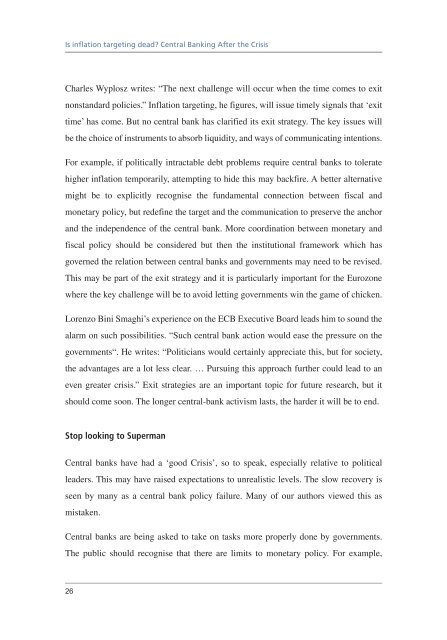Is inflation targeting dead? Central Banking After the Crisis - Vox
Is inflation targeting dead? Central Banking After the Crisis - Vox
Is inflation targeting dead? Central Banking After the Crisis - Vox
Create successful ePaper yourself
Turn your PDF publications into a flip-book with our unique Google optimized e-Paper software.
<strong>Is</strong> <strong>inflation</strong> <strong>targeting</strong> <strong>dead</strong>? <strong>Central</strong> <strong>Banking</strong> <strong>After</strong> <strong>the</strong> <strong>Crisis</strong>Charles Wyplosz writes: “The next challenge will occur when <strong>the</strong> time comes to exitnonstandard policies.” Inflation <strong>targeting</strong>, he figures, will issue timely signals that ‘exittime’ has come. But no central bank has clarified its exit strategy. The key issues willbe <strong>the</strong> choice of instruments to absorb liquidity, and ways of communicating intentions.For example, if politically intractable debt problems require central banks to toleratehigher <strong>inflation</strong> temporarily, attempting to hide this may backfire. A better alternativemight be to explicitly recognise <strong>the</strong> fundamental connection between fiscal andmonetary policy, but redefine <strong>the</strong> target and <strong>the</strong> communication to preserve <strong>the</strong> anchorand <strong>the</strong> independence of <strong>the</strong> central bank. More coordination between monetary andfiscal policy should be considered but <strong>the</strong>n <strong>the</strong> institutional framework which hasgoverned <strong>the</strong> relation between central banks and governments may need to be revised.This may be part of <strong>the</strong> exit strategy and it is particularly important for <strong>the</strong> Eurozonewhere <strong>the</strong> key challenge will be to avoid letting governments win <strong>the</strong> game of chicken.Lorenzo Bini Smaghi’s experience on <strong>the</strong> ECB Executive Board leads him to sound <strong>the</strong>alarm on such possibilities. “Such central bank action would ease <strong>the</strong> pressure on <strong>the</strong>governments“. He writes: “Politicians would certainly appreciate this, but for society,<strong>the</strong> advantages are a lot less clear. … Pursuing this approach fur<strong>the</strong>r could lead to aneven greater crisis.” Exit strategies are an important topic for future research, but itshould come soon. The longer central-bank activism lasts, <strong>the</strong> harder it will be to end.Stop looking to Superman<strong>Central</strong> banks have had a ‘good <strong>Crisis</strong>’, so to speak, especially relative to politicalleaders. This may have raised expectations to unrealistic levels. The slow recovery isseen by many as a central bank policy failure. Many of our authors viewed this asmistaken.<strong>Central</strong> banks are being asked to take on tasks more properly done by governments.The public should recognise that <strong>the</strong>re are limits to monetary policy. For example,26














